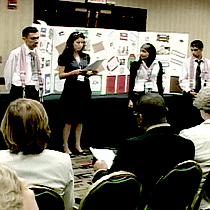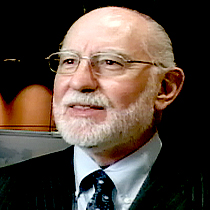2007年VOA标准英语-Teenagers From Around the World Discuss Common(在线收听)
Washington, D.C.
19 July 2007
Poor nutrition, alcoholism, drugs and violence in schools affect children around the world. Usually it's teachers, parents, and other adults who confront them. But don't tell that to the teenagers from 32 countries who are in Washington, D.C. this week. As VOA's Ted Landphair reports, they have tackled life-threatening problems head-on and are not afraid to speak their minds.
 |
| Students of Project Citizen |
Richard Nuccio directs the effort in 70 nations. "There's a kind of innocent arrogance on the part of many young people. They haven't learned yet, as we adults have, that we should know our place and stick to it. They believe, based on their learning, their knowledge of a situation, that they need to be heard. And they aren't shy about arguing and presenting themselves to public figures."
Students from Pinetown, South Africa, for instance, were furious about a wave of teenage suicides. Philile Lukhele says their peers who killed themselves felt useless, unloved by their parents. "You don't believe in yourself. You feel unworthy. You feel like what they're [parents] saying is so true, so powerful, that you should just give up in your life. So that's why they take their lives away."
Philile's friend, Thembek Mthalane says teenagers are saving their suicidal friends just by being there, listening and caring. "Making them feel worth something in life, making them feel not neglected or lonely, it's much easier."
At a Washington hotel and a Senate office building, and in conversations among themselves, students offered other ideas for solving tough community problems. Young Jordanians addressed school violence. Students from Mali described the severe industrial pollution that bespoils their village.
Youngsters like Valon Begaj spoke of rampant drug addiction in Kosovo. "Don't use drugs. Drugs can kill you and kill, also, your family. Drugs are bad, so don't use drugs. Don't walk away from drugs, but RUN from them."
 |
| Director Richard Nuccio |
"They collected money from among their families, printed up flyers with some pictures and documentation that they had about the hospital conditions, and went on the streets of Ramallah, handing out these flyers to the average citizen,” said Nuccio. “And the headline was, 'If you were sick, would you want to go to this hospital?'"
Along with immersion in serious social issues, there was time for exploration and fun.
And time to see one of America's chief symbols of democracy, the White House. The U.S. presidents who have lived here were students once, too. They embraced the message of Project Citizen -- that you can't solve problems just by reading about them.